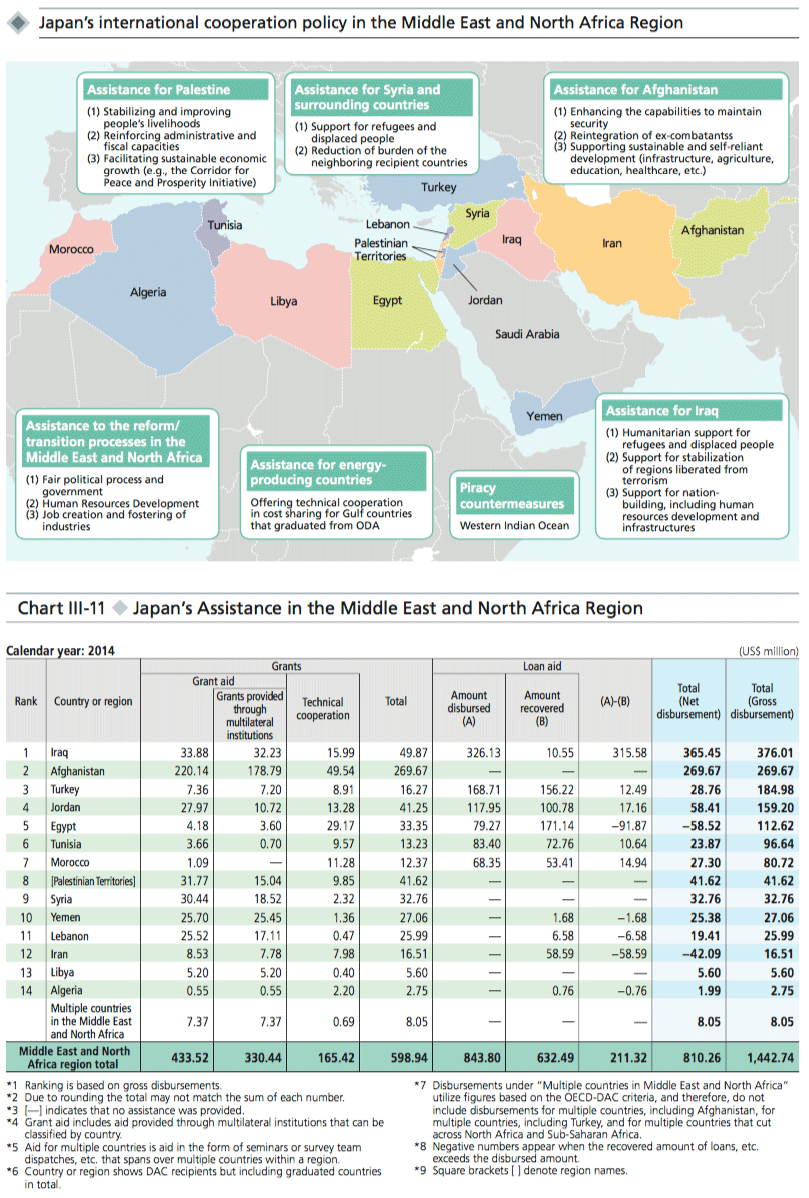4. Middle East and North Africa
The Middle East and North Africa region is a major supply center for the world’s energy, and it accounts for approximately 50% of both the world’s oil and natural gas reserves. In addition, Japan depends on the Middle East for over 80% of its crude oil imports, and the core sea trading routes between Japan and Europe pass through the region. Thus, the Middle East is a critical region for Japan’s economy and energy security.
The Middle East and North Africa region experienced major political upheaval from 2011. The democratization process is proceeding in the countries where longstanding regimes collapsed. Encouraging reform efforts in such countries through financial assistance leads to peace and stability not only in those countries and their neighbors, but also in the entire world.
Meanwhile, some countries in the region still face unstable situations. In Syria, suppression and violence continue four years after March 2011, generating significant numbers of refugees and internally displaced persons (IDPs). In addition, in August 2013, chemical weapons were used in the country, resulting in the deaths of many civilians. Such situations caused serious humanitarian issues. The Islamic State of Iraq and the Levant (ISIL), which extends across national borders in Iraq and Syria and unilaterally declared the establishment of a self-proclaimed “state” in 2014, presents a grave threat to the order in the region. The situations in Yemen and Libya are also destabilizing factors for the region.
Moreover, it is the feature of the region that there are many countries which continue to see high economic growth with large young populations, and it is important to support these promising countries so that they can continue to achieve stable growth.
< Japan’s Efforts >
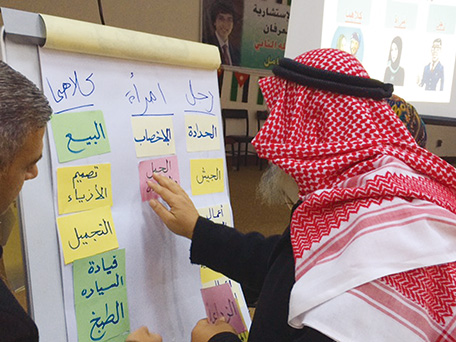
A community leader thinks about jobs that can be performed by men and women at a behavioral change workshop conducted at a Palestine refugee camp in Ajloun, a governorate in the northern part of Jordan. (Photo: Maki Niioka, JICA)
In the Middle East and North Africa, there are many countries and regions with devastated living and social infrastructure and security problems including the Palestinian issue, Afghanistan and Iraq. Since peace and stability in these countries and regions may have a major impact on the stability and prosperity of the region and the international community as a whole, it is vital for the international community to continue to work in solidarity to support these countries and regions for the achievement of sustainable peace and stability, nation-building, and national reconstruction. With this view of such characteristics of the Middle East and North Africa, there is significant meaning in Japan’s proactive support.
Prime Minister Shinzo Abe visited this region five times during the period between December 2012, when the second Abe administration was inaugurated, and January 2015, promoting the fundamental strengthening of Japan-Middle East relations based on the concept of Comprehensive Partnership towards Stability and Prosperity. During his visit to the Middle East in January 2015, Prime Minister Abe announced that Japan would newly carry out assistance of $2.5 billion in non-military fields including humanitarian assistance and infrastructure development, intended for the entire region. In February 2015, following the terrorist incident involving the murder of Japanese nationals in Syria on that same month, Foreign Minister Kishida unveiled the 3-Pillar Foreign Policy in Response to the Terrorist Incident Regarding the Murder of Japanese comprised of: (i) Strengthening counter-terrorism measures; (ii) Enhancing diplomacy towards stability and prosperity in the Middle East; and (iii) Assistance in creating societies resilient to radicalization.
For addressing the issues of Syria that are matters of concern for the international community, Japan announced additional assistance totaling approximately $509 million at the Third International Humanitarian Pledging Conference for Syria (“Kuwait 3” Conference) held in Kuwait in March 2015. This has brought the total of Japan’s assistance to Syria and its neighboring countries to approximately $1.135 billion. Japan, in cooperation with the international community, will steadily implement this assistance and will continue both humanitarian assistance, including assistance for refugees, and contribution to the political dialogue in parallel like the two wheels of a cart.
Iraq
Port Sector Rehabilitation Project (II)
Loan Aid (February 2014 – Ongoing)
Iraq gave rise to the Mesopotamian civilization in ancient times. The country features an expansive fertile plain and has some of the largest oil reserves in the world. However, much of the country’s oil facilities were destroyed in the Iran-Iraq War in the 1980s.
Japanese companies helped develop Umm Qasr Port and Khor Al-Zubair Port on an inlet connected to the Persian Gulf from the 1970s to 1980s. However, both ports later fell into disarray. Vessels were sunk in the war and blocked the passage of tankers, while cranes and cargo-handling equipment were left unmaintained.
Both of these important ports need to be restored for Iraq’s socioeconomic recovery. The Government of Iraq announced its National Development Plan (2013-2017) in 2013, and one of the goals is to restore existing facilities and sea channels, in order to enhance the regional competitiveness of Iraq’s port facilities.
At the request of the Government of Iraq, the Government of Japan commenced loan assistance for the comprehensive rehabilitation of the facilities at both ports. Specifically, this loan assistance funds the removal of sunken vessels that block cargo and passenger ships. It is also being used for civil engineering improvements and expansion of berths, as well as purchasing the necessary cargo-handling facilities and equipment for container ships.
In addition to infrastructure improvements, the assistance is also being used to train port workers. Japan is also providing basic and detailed design work for port construction and maintenance. Furthermore, Japan is helping Iraq to establish a tender system for the procurement of goods, and to use the system to administer and evaluate bids. Additionally, Japan is sharing its environmental preservation know-how, such as how to set up oil fences to prevent marine pollution.
Once these port facilities are rehabilitated, they will be able to compete more closely with those of neighboring countries, which will greatly advance socioeconomic recovery in Iraq. Umm Qasr Port and Khor Al-Zubair Port were developed with the assistance of Japanese companies from the 1970s to 1980s. Now, Japan is providing new assistance to these ports, and is thereby supporting Iraq’s recovery. (As of August 2015)
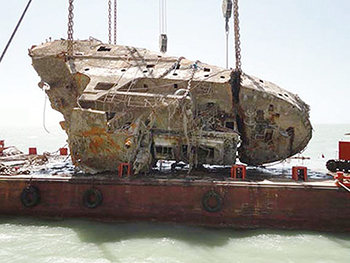
Removal of sunken vessels under the Port Sector Rehabilitation Project Port Maintenance Program. (Photo: JICA)
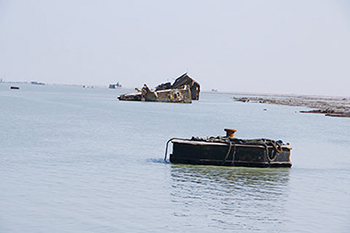
Proposed project site for berth expansion. (Photo: JICA)
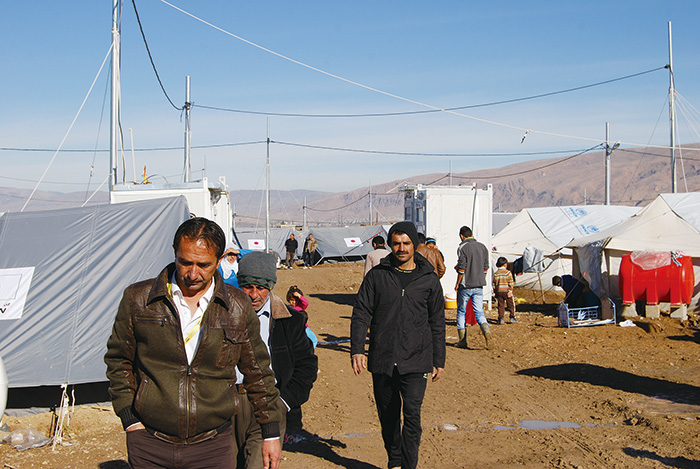
Syrian refugee camp in Basirma, Iraq. (Photo: Embassy of Japan in Iraq)
